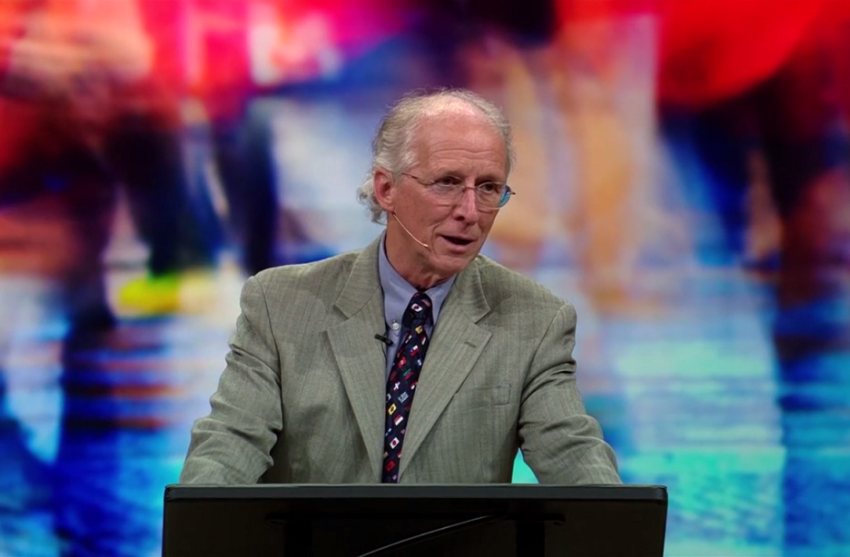John Piper Explains Why Genuine Believers in Christ Can't Lose Their Salvation

Reformed theologian John Piper has said that despite what might seem like suggestions otherwise in the Bible, genuine believers in Jesus Christ cannot lose their salvation, even if they continue sinning.
Piper delved into the complex question on his desiringGod.org podcast Monday, when a listener, identified only as Josh, said he was confused by Hebrews 10:26–29.
"The writer seems to be speaking about the ability to lose salvation by engaging in 'willful sin,' as it has been called. My question: What is the opposite of a 'willful sin?' Is it an accidental sin? Or something else? It seems to me that, due to the presence of the Holy Spirit's conviction, all sin done by the believer is done willfully. Is there something I am not seeing within these verses?" the question states.
Piper admits that Hebrews 10 and Hebrews 6 "often give people the impression that a person possesses the fullness of salvation and then loses it," but adds that a deeper analysis shows that this isn't what the writer wanted to communicate.
The theologian says that the phrase "go on sinning deliberately" is very important.
"First, the word deliberately translates the Greek ἑκουσίως. This word is used in 1 Peter 5:2 like this: 'Shepherd the flock of God that is among you, exercising oversight, not under compulsion, but willingly [ἑκουσίως].' Willingly — here is the same word that we translate as deliberately in Hebrews 10:26," he wrote.
"Now, what this usage shows (and the reason I cite it) is that there are two different kinds of willing, aren't there? One is eager and wholehearted, and the other is under compulsion," he continued.
"In both cases, one could argue that the elders are in fact exercising their will to shepherd the flock of God. In the one case, it's glad. It's an act that engages the whole will. It's happy and energized. In the other case, it's begrudging — an act that evidently goes against significant parts of the will because we would rather be doing something else. They don't really want to shepherd the flock of God, but for money, or for fame, or to avoid guilty feelings, they gut it out and shepherd the flock of God."
Piper noted that all sins are acts of the will, since humans choose them, but that Hebrews 10:26 suggests that it's not just willful sin, but a "more intentional, eager, wholehearted act of the will" that exposes that a supposed believer does not actually have spiritual newness inside.
What is more, he pointed out that to "go on sinning deliberately" is not a single act, or even a few acts, but "settled, persistent continuation in sin."
"What destroys the soul, what puts it beyond forgiveness in verse 26, is not sin per se, but an eager, deliberate, willing, persistent, settled pattern of sin," he clarified.
Looking at other passages in Hebrews 10:14 and Hebrews 3:14, he argued that there is a kind of sanctification in Christ that guarantees a person will never be lost; and that a person who fails to hold fast to Christ to the end had never come to share in Christ in the first place.
Piper said in his conclusions that "No, I don't think genuine believers in Christ lose their salvation," and that "there is a kind of sinning, which is more deliberate, more eager, more persistent, than the way a genuine believer sins — sins that are confessed and forgiven."
Christians from various walks of life have shared their thoughts on the question of whether believers can lose their salvation.
Shane Idleman, founder and lead pastor of Westside Christian Fellowship in Lancaster, California, wrote in an op-ed for The Christian Post in January 2017 that both sides on the issue are passionate in their arguments.
"We all sin and fall short, but the important question to ask is what is the condition of your heart — have you truly repented and believed in Christ as your Lord and Savior, or are you trusting in false assurance?" Idleman said about one of the central questions Christians should examine concerning the issue.
Christian writer Justin Steckbauer wrote in another CP op-ed last month that it is important for believers to understand "the complexities of what salvation is, how we can have it, and how we can keep it."
Steckbauer sided with the view that it is possible for Christians to miss out on salvation, however.
"A new believer may say one prayer, and assume they are saved, but later fall away, thinking all the while that their salvation is eternally secure and there is nothing they can do, no matter how much they sin, to lose it," he wrote.
"Conditional security leads to an understanding that we must continue in the faith, continuing to pursue and engage in our living relationship with Jesus Christ. Conditional security leads to good works."
Related: Can Christians lose their salvation? Understanding eternal security



























